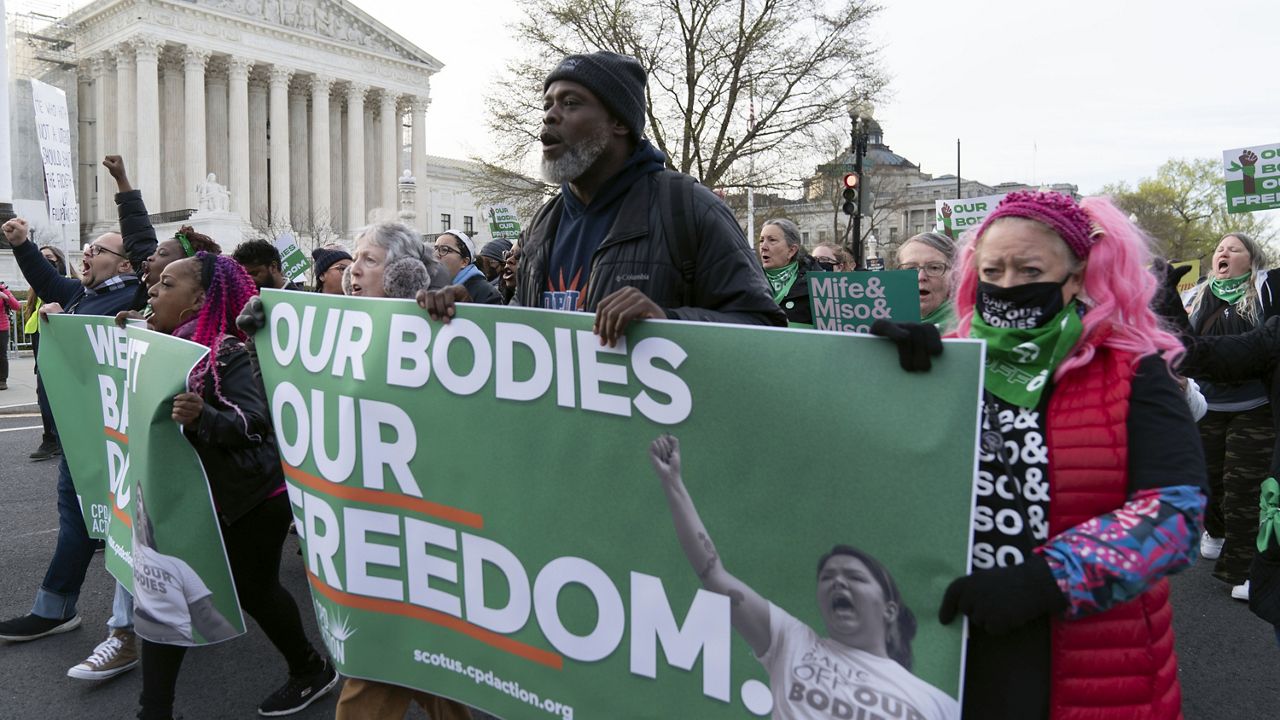Abortion-rights advocates argue a case challenging Food and Drug Administration approvals that made the abortion drug mifepristone easier to acquire could have dangerous ramifications for abortion access and the regulator’s authority over other medications.
A Christian-based medical organization, meanwhile, insists the FDA did not consider safety concerns when it eased restrictions.
And the fight comes against the backdrop of the first presidential election since the Supreme Court overturned Roe v. Wade, ending the nationwide right to abortion.
What You Need To Know
- Abortion-rights advocates argue a case challenging Food and Drug Administration approvals that made the abortion drug mifepristone easier to acquire could have dangerous ramifications for abortion access and the regulator’s authority over other medications
- A Christian-based medical organization, meanwhile, insists the FDA did not consider safety concerns when it eased restrictions
- And the fight comes against the backdrop of the first presidential election since the Supreme Court overturned Roe v. Wade, ending the nationwide right to abortion
- The Supreme Court, which has a 6-3 conservative majority, will soon weigh in again on an abortion-related matters. On Tuesday, the justices will hear oral arguments in Alliance for Hippocratic Medicine v. FDA
The Supreme Court, which has a 6-3 conservative majority, will soon weigh in again on an abortion-related matters. On Tuesday, the justices will hear oral arguments in Alliance for Hippocratic Medicine v. FDA.
If the high court finds against the Justice Department and mifepristone maker Danco Laboratories, it could further restrict abortions in the United States, including in states where it is already legal.
The combination of mifepristone and misoprostol is the most common medication abortion regimen in the U.S. Misoprostol alone can be used for medication abortions, although it is not as effective and can cause more pronounced side effects than the combination.
Last April, a Texas judge invalidated the FDA’s approval of mifepristone. An appeals court later narrowed U.S. District Judge Matthew Kacsmaryk’s ruling, instead only rolling back FDA authorizations from 2016 and later that made mifepristone more accessible. The Supreme Court has put that action on hold while it considers the appeal by the DOJ and Danco.
The overall authorization of mifepristone, from 2000, is not at issue Tuesday after the justices declined to reconsider that part of the appeals court’s decision.
The changes the FDA approved after 2016 included extending the time frame for taking mifepristone from seven weeks of pregnancy to 10 weeks, allowing medical professionals other than doctors to prescribe the drug and dispensing of a requirement for an in-person medical visit, opening the door for it to be mailed directly to patients.
Since Roe v. Wade was struck down in 2022, 14 states have passed near-total abortion bans, while five others have outlawed them after six weeks of pregnancy.
Yet, there were more than 1 million abortions performed last year in the U.S. health care system, a 12-year high, according to the abortion-rights policy think tank the Guttmacher Institute. Medication abortion accounted for 63% of all abortions last year, up 10 percentage points from 2020.
Some telemedicine clinics in blue states with new “shield laws” that protect them from prosecution mail abortion pill to patients living in states with bans.
The Justice Department and Danco Laboratories say mifepristone is safe and highly effective. A legal brief by a group of medical organizations, including the American College of Obstetricians and Gynecologists, says: “When used in medication abortion, major adverse events — significant infection, excessive blood loss, or hospitalization — occur in less than 0.32% of patients, according to a highly regarded study with more than 50,000 patients.”
Mifepristone results in a completed abortion 97.4% of the time, according to U.S. studies cited by the FDA.
Abortion opponents, however, say the more lax restrictions have resulted in many more “emergency complications.” But that argument lumps together women experiencing a range of issues with mifepristone — from the drug not working to people who may simply have questions or concerns but don’t require medical care.
“The FDA gutted the safety standards for these drugs—without a single scientific study to show the safety of these actions,” the conservative legal group Alliance Defending Freedom, which represents the plaintiffs in the mifepristone case, wrote Monday on X, formerly Twitter. “And the FDA knew better. In 2021, the agency was fully aware that removing safety measures would cause more women to go to the ER in medical distress. But it pushed ahead anyway—no matter the consequences to women.”
ER visits don’t always reflect big problems, doctors told The Associated Press.
Some people may go there after a medication abortion because they want to be checked out or have questions but don’t have a doctor, said Ushma Upadhyay, one of the researchers in the study that found mifepristone overwhelmingly safe. Others, she said, “don’t want to go to their primary care provider about their abortion” because of stigma.
The Supreme Court’s decision, expected this summer, could impact the presidential race, a likely rematch between incumbent President Joe Biden and former President Donald Trump.
In a call with reporters Monday morning, the Biden campaign claimed the case is the next step by Trump and Republicans toward a nationwide abortion ban. Trump nominated three Supreme Court justices who voted to overturn Roe, campaign officials noted.
“Trump’s extreme MAGA Republican allies are ripping away access to reproductive health care across the country, inserting themselves into the most personal decisions women can make,” said Biden campaign manager Julie Chavez Rodriguez.
“Joe Biden and Vice President Kamala Harris are running to beat back these attacks. … They want to undo Trump’s damage and protect reproductive health care access in every state.”
Said Sen. Elizabeth Warren, D-Mass., a member of the Biden campaign’s national advisory board: “Despite what anti-abortion extremists say, this case before the Supreme Court is not about the safety or efficacy of medication abortion. The FDA has already made clear that mifepristone is safe and effective, and Americans have been safely and effectively using this medication for more than 20 years. This case is about Donald Trump and the Republican Party marching us toward a full-on national abortion ban.”
The Trump campaign did not respond to an email Monday seeking comment about the case.
In a radio interview last week, Trump said “people are agreeing” on a 15-week national abortion ban, adding he will “make that announcement at the appropriate time.” However, in the same interview, the former president said he thinks abortion laws should be decided by the states.
In its budget proposal for the next fiscal year, the Republican Study Committee, which comprises about 80% of GOP lawmakers in the House, last week endorsed legislation that would rescind the FDA rule removing safety protocols for mifepristone.
Political experts have blamed Republicans’ poorer-than-expected performance in the 2022 congressional midterms on outrage over the Supreme Court overturning Roe. And when abortion has directly been on the ballot, voters have supported protecting it, including in red states.
The Associated Press contributed to this report.
Ryan Chatelain - Digital Media Producer
Ryan Chatelain is a national news digital content producer for Spectrum News and is based in New York City. He has previously covered both news and sports for WFAN Sports Radio, CBS New York, Newsday, amNewYork and The Courier in his home state of Louisiana.








